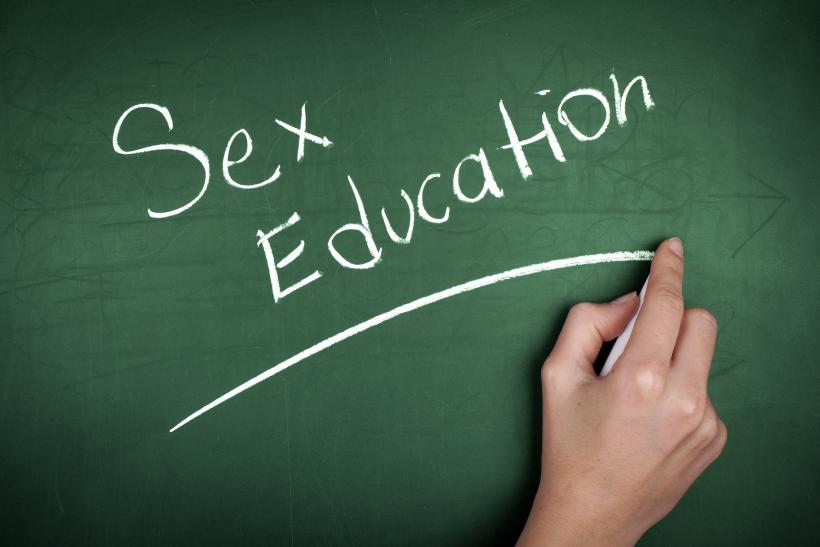
Melissa Garber is a sex-ed teacher, and she's here to answer your questions about the state of Sex Ed today.
It’s no secret that sex ed is a mess.
Children are not getting the educations they need to thrive. STD rates are at an all-time high, many schools are still rigidly teaching abstinence and nothing else, and others aren’t even required to be scientifically correct when teaching about sex.
We need to change the conversations we’re having around sex, and the things we’re teaching young people about sexuality. And to do so, we need to give the people who know what they're talking about more of a voice. Enter Melisa Garber, a New York-based sex-ed teacher, who filled me in on what she's going through, what needs to change, and how to get there.
What made you want to be a sex ed teacher?
From a young age I had always been interested in why it was taboo to discuss sexuality, but it wasn’t until college that I began to think of sex education as a possible career. I interned with the sexual health peer advising program at my college known as the “sexperts,” and began organizing sex-positive workshops and events around campus.
After I graduated, I worked in HIV/AIDS advocacy for some years, eventually going back to school to get a Master's Degree in Public Health, with a focus on sexuality and health. It was at this point, while taking a class on the pedagogy of sex education, that I thought about teaching younger kids and starting these conversations early.
What ages do you teach?
I primarily teach middle school, so fifth through eighth grade. But I also teach a seminar in the high school about art and activism surrounding HIV/AIDS in the 1980s.
What do you remember most about your experience in sex ed as a kid?
I remember in fifth grade when we were separated by gender and shown a really old video on puberty. It didn’t explain much, and we didn’t have any time to address questions afterward. The subject was never mentioned again until high school when we had to take one semester of health class. But I remember it mainly focused on drugs and alcohol.
Luckily, I grew up in a pretty sex-positive household, and my dad is a doctor so I could talk to him.
How does what you teach differ from what you learned about sex growing up?
I try to address aspects of sexuality straight on. I make sure that kids learn about sexual autonomy, pleasure, consent, physical and romantic attraction, as well as contraception, ways to prevent infections, and communication skills.
I think it’s important to empower adolescents to make informed choices when it comes to their sexual identities without policing their behavior and assuming that they can’t handle these type of conversations.
What is the most important thing you teach your students?
Hopefully, that they matter.
That may seem like a weird answer, but in my interactions with my students I try to give them a safe space to have their voices heard. I don’t teach at them, I teach with them. So many sex-ed programs focus on ways to prevent adolescents from engaging in risky behavior, instead of meeting them where they are and trusting them to make smart decisions about their sexual health.
When I researched a number of evidence-based, sex-education curricula during my master’s program, I couldn’t find any that mentioned sex feeling good or being a positive experience. What kind of message does that send to these kids?
I also couldn’t find many programs that were inclusive of LGBTQ+ identities beyond using the term “sexual partner.” It’s important for me to utilize inclusive language, such as “internal” and “external” condoms instead of male and female condoms, as well as discussing dental dams. I’ve even shown students how to make a dental dam out of a condom.
What are students most curious about in sex-ed class?
I guess that depends on the age… The younger kids are more curious about whether puberty hurts and why their bodies are changing so much. The older kids are more curious about relationships and how to know when consent isn’t being clearly communicated.
I’ve also had some boys ask why most contraceptive methods are directed toward female-bodied individuals, and male-bodied people rely solely on condoms.
What is the most awkward thing a student has ever asked?
Garber: My first year teaching I was asked, “Does anal sex feel like taking a shit?” I knew I had found my calling when I managed to respond without laughing and say that anal sex feels differently for different people.
I explained that some people may enjoy it and others may not, some people who have prostates might like the stimulation, but it varies, so the main thing is to check in and make sure that you and your partner are clearly communicating what feels good and what doesn’t.
Why do you teach about pleasure?
Garber: If we don’t teach students about pleasure, we risk raising individuals who engage in sexual behaviors they do not enjoy, which distances them further from understanding their bodies. It’s important for adolescents to know that there are parts of their bodies that serve the purpose of feeling pleasure, so that if something doesn’t feel good, they know they have the right to say so and better guide their partner.
What do you feel is the one aspect of sex ed that we're failing to teach our children?
Garber: We are definitely falling short when it comes to discussing sexual autonomy, pleasure, and consent. Very few programs, if any, include masturbation — but it is important that we not only explain that masturbation is a normal behavior (even infants and toddlers are known to touch their genitals) but that it’s also a great way to explore your body and how you like to be touched.
What are your thoughts on abstinence-only education?
Garber: I find it to be extremely ineffective and possibly damaging to our youth. When adolescents are only being told to abstain until marriage, they are running the risk of never learning about contraception or sexually transmitted infections, thus increasing the likelihood of teen pregnancy and infection. I believe the reason that abstinence-only education is so rampant across the U.S. is because some adults do not believe that, when given all the information, adolescents will make smart choices. I can tell you first-hand that this is faulty logic and untrue.
Where does the law come in where sexual education is concerned?
Garber: As of right now, it is up to the states to mandate what kind of sex education program, if any, they want to be implemented. These mandates vary across state lines, with some requiring abstinence-only education be taught, and others specifying that the information provided be medically accurate. You can learn more about this from the Guttmacher Institute.
What societal ills could be repaired by comprehensive sex ed for young people?
Garber: Planned Parenthood had shared a link [on Facebook] to an Everyday Feminism article that urged people to use inclusive language when discussing abortion, as not everyone who has a uterus identifies as a woman.
When I looked at the comments, I was shocked by the amount of transphobic hatred that was being spewed! I couldn’t understand how people who supposedly support Planned Parenthood (by liking their Facebook page) could be so closed-minded and hateful. I knew that my students would never say these things, as they have a very clear understanding of the differences between sex assignment at birth and gender identity. They know that there are girls with penises and boys with vulvas and genderqueer non-binary people, too.
There would be a lot more understanding and compassion if we had comprehensive sex education early on. Perhaps people’s perceptions of gender and sexuality would be less fixed, leading to less violence.
In the meantime, I feel good knowing that I’m doing my small part.


